
[Alert] Ancient Tonic Found to Reduce Parkinson’s Disease Risk
- A decade of work comes to fruition with this medical breakthrough. Find out more…
- Discover how to cut your risk of Parkinson’s Disease by a third while burning fat and combating inflammation
- Step-by-step instructions on how to make this ancient health tonic.
Editor’s Note: Today, Living Well is releasing our best solution for improving both your bone AND heart health. It’s our newest addition to our non-GMO supplement line, and it’s called D3+K2. D3+K2 delivers you the research-backed dose and forms of vitamin D3 and vitamin K2 – the two best natural ingredients shown in human studies to help support bone strength and help reverse arterial stiffness. If you want to maintain a healthy heart, flexible arteries, and strong bones, this is the one solution you need. Click here for more information and secure your supply.
If you are a Living Well Daily Insider, you automatically qualify for 20 percent off your order!
Dear Reader,
Parkinson’s disease is slow-developing yet progressive neurological disorder.
Most patients experience their first symptoms around the age of 60 or older, and they can be as benign as a barely noticeable tremor in the finger or hand.
However, as the disease progresses, the symptoms can progress to serious difficulties in speaking, locomotion, coordination, and balance.
Every year, over 60,000 Americans are diagnosed with Parkinson’s disease.
But the numbers only start here.
Currently, there are as many 1 million Americans suffering from Parkinson’s disease and an estimated 10 million people worldwide.
And these numbers don’t include the thousands of cases that go undetected.
Plus, Parkinson’s comes with a hefty price tag — the combined direct and indirect costs of Parkinson’s are an estimated whopping $25 billion annually in just the U.S.1
Recently, Australian researchers at La Trobe University in Melbourne made an unparalleled advancement in Parkinson’s disease research and diagnosis.
With funding from the Michael J. Fox Foundation for Parkinson’s Research, the team of scientist led by microbiology professor Dr. Paul Fisher developed the first blood test that can determine if a patient has Parkinson’s disease. We will give you the details in just a bit.
With this new discovery, medical providers will be able to speed up diagnosis of the neurological disorder and implement crucial treatments earlier, which could improve countless lives and may even help reduce costs.
And while this test is great news for early medical intervention, there is a natural solution that can help reduce the risk of Parkinson’s — one that has been used for centuries as a health booster.
We will reveal this health tonic, how it can protect you from Parkinson’s disease, and how to make it in a moment.
Let’s talk about this blood test first…
![]() A Decade’s Discovery
A Decade’s Discovery
The new blood test detects the abnormal blood cells that cause Parkinson’s disease. And since there is no cure for Parkinson’s currently, results from this test will permit patients to receive treatment quickly — hopefully, before brain damage starts.
Fisher had this to say about his team’s revolutionary discovery:
Early diagnosis and treatment could enable better outcomes and greater quality of life for people with the condition, which will be of great benefit to sufferers and their families.2
The scientists’ work is based in work started over 10 years ago when they discovered “alarms” were switched on in cells. These alarms were suspected to be liable for Parkinson’s and other incurable conditions that have faulty mitochondria.
When unusual activity occurs in cells with diseased mitochondria, it can trigger movements that may cause damage to vital brain cells.
Fisher and his team will continue their blood cell research in hopes of uncovering information that could eventually lead to a cure for Parkinson’s.
While this is great news for folks who are already suspected to suffer from Parkinson’s, there is an easy and healthy way to reduce the likelihood of Parkinson’s disease by a third for folks who don’t have Parkinson’s.
So what is this Parkinson’s fighter?
![]() Power Plant of the Ancients
Power Plant of the Ancients
Yerba mate.
This South American plant is found in parts of Brazil, Paraguay, Argentina, and other South American countries. It’s been used by the native peoples of these regions for both social and medicinal practices for centuries, typically as a tea.
However, a study released in the Journal of the Neurological Sciences reveals that yerba mate also has a protective role in the development of Parkinson’s disease.
The study examined hospital records of those who drank yerba mate regularly. And after being matched with two controls and variables like smoking status and alcohol intake were considered, the research found yerba mate drinkers reduced their chances of suffering from Parkinson’s disease to just 63 percent.3
This means drinking yerba mate tea can reduce your risk of Parkinson’s by a third!
Researchers believe yerba mate’s bioactive compound content is one of the reasons why it’s an effective Parkinson’s preventative. These include xanthines, phenolics, theobromine, and caffeine.
While more research is needed, it’s a good idea to start incorporating yerba mate into your daily routine.
Plus, it has more health benefits!
Yerba mate is full of natural phenolic compounds and antioxidants (natural cancer-fighters and metabolism boosters). It’s also good for a quick pick-me-up, as it has a caffeine content equal to most coffees.4
Not to mention yerba mate signals the body to burn more fat, regulates blood sugar levels, and helps reduce inflammation related to obesity.5
While it can be enjoyed hot, the iced version can be refreshing treat as well.
This makes yerba mate a great choice for iced tea in the coming hot months of summer — you can quench your thirst while fighting Parkinson’s and enjoying other health benefits!
Here’s the best way to brew it…
![]() Get the Health Without the Grit
Get the Health Without the Grit
Yerba mate is a leafy and at times even dusty loose tea. This can make for a gritty and cloudy iced tea experience.
Chemex brewing yerba mate is a great way enjoy it and to accentuate its refreshing and earthy flavor while also preventing leaves and other small particles from swimming in your glass.
To do this, you are going to need the following items:
- 1 8-cup Chemex
- 1 8-cup Chemex filter
- 50 g loose yerba mate tea
- 40 oz. of just-boiled water
- 1 1-gallon tea pitcher.
Here’s how you do it:
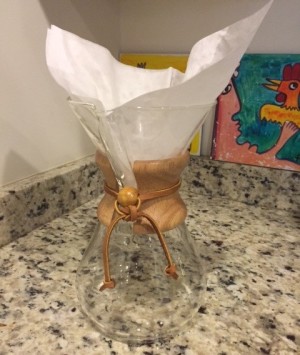
- Rinse the filter and place in the Chemex.
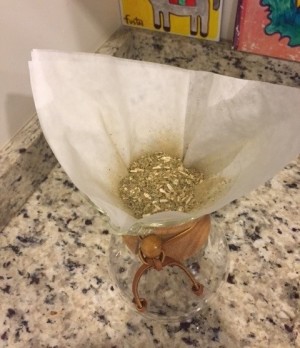
- Add tea.
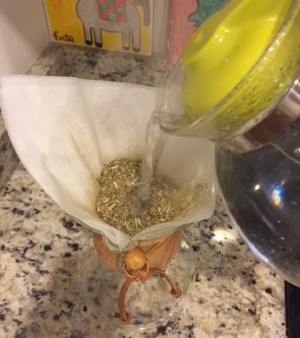
- Slowly pour 40 oz. of water over the tea.
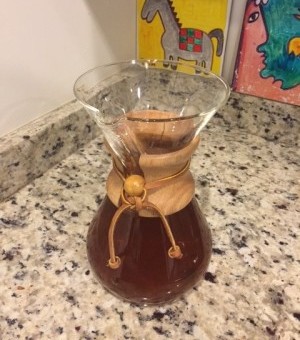
- Remove filter and allow to cool completely.
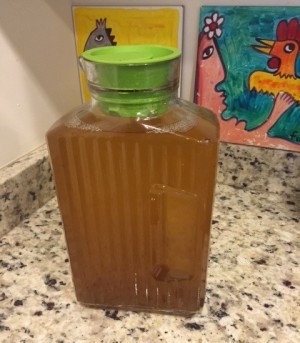
- Pour into gallon pitcher and add enough water to fill the gallon container.
This can be stored in the refrigerator for up to one week.
Yerba mate is available in most health food stores. To order it online, click here.
If you are interesting in a Chemex brewer (also great for coffee), click here.
Live well,

Natalie Moore
Managing editor, Living Well Daily
Sources
[2] Medical First: Blood Test Detects Parkinson’s Disease
[4] Yerba maté: Pharmacological Properties, Reasearch and Biotechnology
[5] The positive effects of yerba maté (Ilex paraguariensis) in obesity.
Written By Natalie Moore
Natalie Moore is a dedicated health researcher with a passion for finding healthy, natural, and science-based solutions. After a decade of direct healthcare experience in western and natural medicine, she was involved in public health research before joining Living Well Daily.
View More Free Articles
This Sleep Mistake Is Doubling Your Disease Risk
Think your inconsistent bedtime is just a harmless habit? Think again. New research reveals that going to bed at different times each night isn’t just making you tired—it could be dramatically increasing your risk of serious diseases. But the key to making sure poor sleep doesn’t derail your health goals likely isn’t what you think…....
Stop Obsessing Over Diet Trends
Can we stop with the endless diet debates already? Every other week there’s a new headline shouting about which diet is best for weight loss, heart health, or diabetes. Paleo, keto, low-carb, high-protein… it’s exhausting. And now, a new meta-analysis is out comparing the Mediterranean diet, the DASH diet, and something called AHEI (that’s “Alternative...
A New Reason to Ditch Processed Junk
If you’ve ever walked the inside aisles of your local grocery store and thought, “This is all just junk,” your instincts were spot on. A new study published in the journal Thorax just added another red flag to the list of dangers linked to ultra-processed food—a 41 percent higher risk of lung cancer. That’s right....
When Being Winded on Stairs Is Serious (And When It Isn’t)
I had an athlete visit me recently because he experienced shortness of breath while climbing stairs. He is in great shape, so he was worried about what it might mean. “Doc,” he said, “I run five miles three times a week. Why am I huffing and puffing after two flights of stairs?” His concern is...
Study EXPOSES Hidden Danger Lurking in Your Car
We think of our homes and cars as safe havens. But according to a startling new study, they may be flooding your lungs with microscopic plastic particles—every single day. Researchers in France recently found that adults inhale an average of 68,000 microplastic particles daily from indoor air alone. To put that in perspective, that’s about...
Mailbag: Is Modern Food Making You Snore?
“What can cause snoring, and is there a way to correct this issue?” —Seeking Silence Hi Seeking, Snoring happens when the soft tissues in your throat relax and vibrate as air passes through during sleep. While several factors can cause snoring—from sleep position to nasal congestion—I want to share one trigger that might surprise you....
Simple Food Swap SLASHES Dementia Risk 28%
Let’s be honest… who would jump at the chance to cut their dementia risk by 28 percent. And no, you don’t need to run marathons, survive on broccoli, or learn to play the zither (whatever that is) to make it happen. All it takes is one easy swap—something that’s probably already in your refrigerator. Researchers...
This SMART Floss Exposes Hidden Health Danger
Scientists have created dental floss that doesn’t just clean between your teeth—it also tracks your stress while you’re flossing. Now, I know what you’re thinking… “Great—now even flossing is going to stress me out by telling me how stressed I am.” But this fascinating new tool from Tufts University could be a game-changer for understanding...
Is This "Safe" Sweetener Damaging Your Brain?
The headlines are alarming… “Popular Sugar Substitute Linked to Brain Cell Damage” and “Erythritol Could Damage Critical Brain Barrier” are just two of the dozens I’ve spotted recently. But before you toss every sugar-free product in your pantry, let’s take a closer look at what this study actually shows—and what it doesn’t. The latest research...
This Summer Threat Could SPIKE Your Blood Sugar
Picture this… It’s another scorching hot summer day. You crank up the air conditioning while watching the weather forecast, which predicts yet another “record-breaking” heat wave. It’s starting to feel like just another miserably uncomfortable summer. But what you might not realize is that—if you have diabetes—those rising temps could do far more damage to...









